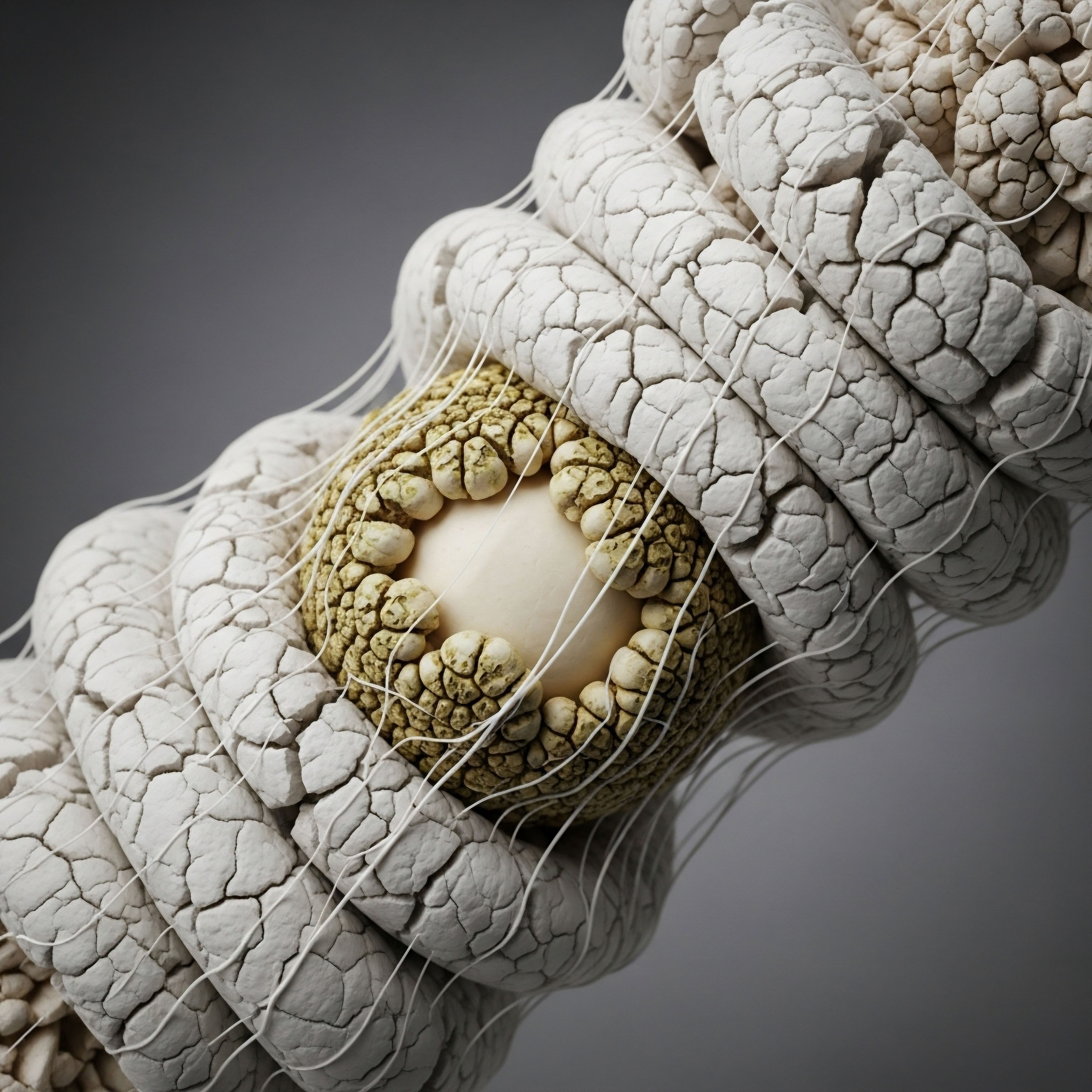

The Midnight Engine Recalibration
The human body operates as a sophisticated biological machine, a high-performance system designed for peak output. Yet, the true architects of this performance are often overlooked during the day, diligently working in the shadows of our unconscious hours.
Nocturnal repair is not a passive state of inactivity; it is the critical, foundational period where the body’s intricate systems are recalibrated, regenerated, and optimized for the demands of conscious life. This nightly restoration is the bedrock upon which daytime vitality, cognitive acuity, and physical prowess are built. Understanding this process is the first step toward unlocking a new echelon of personal performance.
The endocrine system, the body’s master regulator, orchestrates a symphony of hormonal activity during sleep. Growth Hormone (GH), often referred to as the “youth hormone,” is predominantly released during the deep stages of slow-wave sleep. GH is fundamental for tissue repair, muscle protein synthesis, bone density maintenance, and the metabolic processing of fat.
When sleep is compromised, GH release is blunted, directly hindering recovery from physical exertion, slowing the regeneration of cellular structures, and impeding the body’s capacity to optimize its composition. This hormonal deficit creates a cascading effect, diminishing energy levels, slowing metabolic rate, and increasing susceptibility to injury and fatigue.
Testosterone, another critical hormone for both men and women, also exhibits a diurnal rhythm, with its highest levels typically occurring in the morning, a pattern influenced by nocturnal sleep cycles. Adequate sleep supports optimal testosterone production, a hormone vital for energy, mood regulation, libido, muscle mass, and bone strength.
Insufficient sleep disrupts this natural rhythm, leading to diminished testosterone levels. This reduction directly impacts drive, focus, strength output, and the ability to maintain lean muscle mass, creating a significant impediment to peak physical and mental performance.
Beyond hormonal regulation, sleep is the primary window for cellular regeneration and waste clearance. During deep sleep, the body initiates robust processes of autophagy, where cellular debris and damaged components are identified and removed, making way for new, healthy cell structures.
This molecular housekeeping is essential for preventing cellular dysfunction, mitigating the effects of oxidative stress, and supporting long-term tissue integrity. The glymphatic system, the brain’s waste removal mechanism, is significantly more active during sleep, clearing neurotoxins that accumulate during waking hours. Impaired glymphatic function is linked to neurodegenerative diseases and cognitive decline.
The impact extends directly to cognitive function. Sleep is indispensable for memory consolidation, learning, and the executive functions of the brain, including decision-making, problem-solving, and emotional regulation. Neural pathways are strengthened, and information acquired during the day is processed and stored. Without sufficient, high-quality sleep, cognitive performance suffers acutely. This manifests as reduced attention span, impaired judgment, slower reaction times, and diminished creativity, all of which are antithetical to achieving peak performance in any domain.
Metabolic health is also profoundly influenced by nocturnal repair. Sleep quality directly affects insulin sensitivity and the regulation of appetite hormones like ghrelin and leptin. Chronic sleep deprivation can lead to insulin resistance, increased hunger, cravings for calorie-dense foods, and a predisposition to weight gain and metabolic syndrome. Optimizing sleep, therefore, becomes a powerful lever for metabolic control and body composition management, enabling a more efficient energy substrate utilization during performance.
Clinical studies indicate that a consistent deficit of just 1-2 hours of sleep per night can lead to a 10-15% reduction in cognitive processing speed and an increase in metabolic dysregulation markers.
In essence, the night is not a period of downtime but an active, essential phase of biological maintenance and enhancement. It is where the body’s internal architecture is fortified, its chemical balance is restored, and its operational systems are primed for superior function. To neglect nocturnal repair is to operate with a fundamental flaw in one’s performance blueprint.


Engineering Your Deep Sleep Protocols
Achieving peak performance through nocturnal repair necessitates a deliberate, engineered approach. This involves understanding the complex physiological processes at play during sleep and implementing precise strategies to optimize them. It is about mastering the body’s natural rhythms and providing the optimal conditions for its restorative functions to operate at their highest capacity. This is not about passive rest; it is about active biological engineering during sleep.

Sleep Architecture and Cycles
Sleep is not a monolithic state but a dynamic cycle comprising distinct stages ∞ Non-Rapid Eye Movement (NREM) sleep and Rapid Eye Movement (REM) sleep. NREM sleep is further divided into stages, with Stage 3 (deep sleep or slow-wave sleep) being paramount for physical repair and GH release.
REM sleep, characterized by vivid dreaming, is critical for cognitive functions, emotional processing, and memory consolidation. A typical sleep cycle lasts approximately 90-110 minutes and repeats several times throughout the night. The goal of engineered nocturnal repair is to maximize time spent in these restorative stages, particularly deep sleep.

Circadian Rhythm Alignment
The body’s internal biological clock, the circadian rhythm, governs sleep-wake cycles, hormone secretion, and metabolic processes. Aligning your lifestyle with this natural rhythm is foundational.
- Light Exposure: Morning sunlight exposure helps anchor the circadian clock, signaling the body to be alert. Conversely, minimizing bright light exposure, especially blue light from screens, in the hours leading up to bedtime facilitates melatonin production, the hormone that induces sleepiness.
- Consistent Schedule: Maintaining a regular sleep and wake time, even on weekends, reinforces the circadian rhythm, leading to more predictable and restorative sleep.
- Meal Timing: Irregular meal patterns can disrupt circadian signaling. Consistent eating times, with a preference for earlier dinners, support better sleep regulation.

Hormonal and Peptide Interventions
For individuals seeking to optimize performance beyond baseline, targeted hormonal and peptide interventions can play a significant role, always under expert guidance.

Testosterone Optimization
For men experiencing symptomatic hypogonadism, Testosterone Replacement Therapy (TRT) can restore physiological levels, profoundly impacting energy, mood, libido, and body composition. The administration method (injections, gels, patches) and timing are crucial for mimicking natural diurnal rhythms and maximizing benefits while minimizing side effects. For women, testosterone in physiological replacement doses can also enhance vitality and performance.

Growth Hormone Secretagogues and Peptides
Peptides such as Sermorelin and Ipamorelin are GH secretagogues, designed to stimulate the pituitary gland to release more endogenous GH. These agents can enhance muscle repair, fat metabolism, and overall tissue regeneration. Other peptides, like CJC-1295 (often combined with DAC for longer half-life or without for shorter), further support GH release. Their strategic use, often timed before bed to align with natural GH pulses, can amplify the body’s inherent repair mechanisms.

Thyroid Support
Optimal thyroid hormone levels are critical for metabolic rate and energy production, directly influencing sleep quality and recovery. Addressing subclinical hypothyroidism or optimizing thyroid hormone balance is a key component of comprehensive performance enhancement.

Environmental Optimization
The sleep environment is a powerful, often underutilized, tool for enhancing nocturnal repair.
- Darkness: Creating an environment of absolute darkness is paramount. This includes using blackout curtains, covering all light-emitting electronics, and employing a comfortable, light-blocking eye mask. Even minimal light can suppress melatonin.
- Temperature: A cooler bedroom temperature, typically between 60-67°F (15-19°C), is optimal for initiating and maintaining deep sleep. The body’s core temperature naturally drops as it prepares for sleep.
- Sound: Minimizing noise disturbances is essential. White noise machines or earplugs can be effective in creating a consistent, soothing auditory environment.

Lifestyle Integration
Daytime habits directly influence nighttime recovery.
- Nutrition: The timing and composition of meals are significant. Avoiding heavy meals, excessive caffeine, and alcohol close to bedtime supports sleep quality. A balanced intake of macronutrients and micronutrients throughout the day provides the building blocks for repair.
- Exercise: Regular physical activity, particularly resistance training, stimulates beneficial hormonal responses. However, intense exercise too close to bedtime can be disruptive. Strategic timing allows exercise to enhance, rather than hinder, nocturnal repair.
- Stress Management: Chronic stress elevates cortisol, a catabolic hormone that interferes with sleep architecture and recovery. Implementing stress-reduction techniques such as mindfulness, meditation, or breathwork is critical for optimizing the hormonal milieu for repair.
The synergy of these elements ∞ understanding sleep cycles, aligning circadian rhythms, judicious hormonal and peptide support, optimizing the environment, and refining daily habits ∞ creates a robust protocol for engineered nocturnal repair. This systematic approach transforms sleep from a passive necessity into an active performance-enhancing modality.
Research indicates that a consistent pre-sleep routine, including light reduction and temperature control, can increase deep sleep duration by up to 20%.


Timing Your Biological Ascent
The efficacy of nocturnal repair and performance optimization hinges not only on the ‘why’ and ‘how’ but critically on the ‘when’. Strategic timing of sleep, environmental cues, and therapeutic interventions ensures that the body’s inherent regenerative capabilities are amplified and synchronized with our performance objectives. This temporal precision transforms potential into realized, consistent peak performance.

The Sleep Chronology for Apex Performance
The duration and consistency of sleep are paramount. While individual needs vary, a consistent 7-9 hours of high-quality sleep per 24-hour period is the general benchmark for optimal physiological function and repair. Deviations from this range, particularly chronic sleep restriction, undermine all restorative processes.
- Duration: Aim for a consistent sleep duration that leaves you feeling fully recovered and energized upon waking. Tracking subjective recovery metrics and objective data (if available) can help identify your personal optimal window.
- Consistency: The most potent circadian signal is a regular sleep-wake cycle. Adhering to a fixed bedtime and wake-up time, even on non-training or non-work days, stabilizes hormonal rhythms and enhances sleep quality. This consistency primes the body for efficient repair.
- Sleep Cycles: Recognizing that sleep occurs in ~90-minute cycles is important. Understanding that the initial cycles are richer in deep sleep (physical repair) and later cycles in REM sleep (cognitive processing) informs how total sleep duration impacts different aspects of performance.

Strategic Application of Interventions
The timing of external inputs and therapeutic agents is crucial for maximizing their impact on nocturnal repair.

Circadian Phase Alignment
The body’s internal clock dictates when certain hormones are released and when repair processes are most active.
- Light Management: Morning light exposure (within the first hour of waking) is critical for setting the circadian clock for the day. Evening light reduction, starting 2-3 hours before desired bedtime, signals the brain to initiate melatonin production, facilitating sleep onset.
- Melatonin Production: This hormone’s release is suppressed by light and triggered by darkness. Ensuring a dark sleep environment is a temporal cue that directly influences the onset and quality of sleep.

Hormonal and Peptide Administration
The timing of exogenous hormones and peptides is designed to either supplement natural rhythms or leverage specific biological windows.
- Testosterone: For TRT, administration often aligns with the body’s natural diurnal rhythm, typically involving daily application of gels/patches or less frequent injections timed to maintain stable, physiological levels without excessive supraphysiological peaks that could disrupt natural feedback loops.
- Growth Hormone Secretagogues (e.g. Sermorelin, Ipamorelin): These are frequently administered in the evening, often 1-2 hours before bedtime. This timing leverages the natural peak in GH secretion that occurs during deep sleep, enhancing the regenerative effects.
- Peptides with Longer Half-Lives (e.g. CJC-1295 DAC): While these can be dosed less frequently, strategic timing, often in conjunction with exercise or before sleep, can still optimize their impact on GH release and repair processes.

Integrating Nocturnal Repair into a Performance Schedule
Nocturnal repair is not an isolated event but an integral component of a holistic performance strategy.
- Pre-Sleep Routine: Establishing a consistent pre-sleep routine signals to the body that it is time to wind down and prepare for repair. This can include light reading, gentle stretching, or a warm bath.
- Post-Exercise Recovery: For athletes and highly active individuals, prioritizing sleep after intense training sessions is critical. The window for muscle protein synthesis and glycogen replenishment is enhanced by adequate post-exercise nutrition and subsequent quality sleep.
- Cognitive Demands: Periods of intense cognitive work or learning require sufficient sleep for consolidation. Scheduling demanding mental tasks with adequate sleep buffer before and after ensures optimal information retention and recall.
The timing of your sleep and related interventions dictates their effectiveness. By precisely scheduling sleep, managing light exposure, and strategically administering performance-enhancing agents, you align your biological systems with your goals, ensuring that every hour of rest contributes directly to your ascendancy.
Data suggests that individuals who consistently sleep between 7.5 and 8 hours per night demonstrate a 10-15% improvement in reaction time and problem-solving accuracy compared to those sleeping less than 6 hours.

The Apex State Achieved
The mastery of nocturnal repair is not merely an enhancement; it is the fundamental blueprint for sustained, peak human performance. It is where the body, unburdened by the constant demands of conscious action, engages in its most critical work ∞ rebuilding, refining, and optimizing at a cellular and systemic level.
By understanding the profound ‘why’ ∞ the hormonal, cellular, cognitive, and metabolic imperatives of sleep ∞ and mastering the ‘how’ ∞ the engineered protocols involving circadian alignment, environmental control, and strategic interventions ∞ we unlock the ‘when’. This temporal precision ensures that sleep becomes your most potent ally in the pursuit of vitality and excellence.
The Vitality Architect understands that true performance is not solely about exertion; it is equally, if not more, about intelligent recovery and biological recalibration. The body is a high-performance engine, and sleep is its essential maintenance cycle, its pit stop for critical upgrades.
To achieve the apex state ∞ a condition of enduring energy, sharp cognition, robust physical capacity, and profound well-being ∞ one must commit to optimizing this nightly transformation. This commitment is the ultimate expression of self-mastery, recognizing that peak performance is a 24-hour endeavor, meticulously constructed through both action and intentional rest.
Embrace the night as your laboratory for biological enhancement. Treat your sleep not as a luxury, but as a non-negotiable pillar of your performance architecture. When you engineer your nocturnal repair with precision and purpose, you don’t just recover; you transcend. You become the architect of your own enduring vitality, capable of performing at your highest potential, day after day, year after year. This is the ultimate upgrade.

Glossary

nocturnal repair

growth hormone

during sleep

testosterone

cellular regeneration

deep sleep

cognitive function

peak performance

sleep quality

light exposure

performance enhancement

sleep architecture

circadian rhythms




